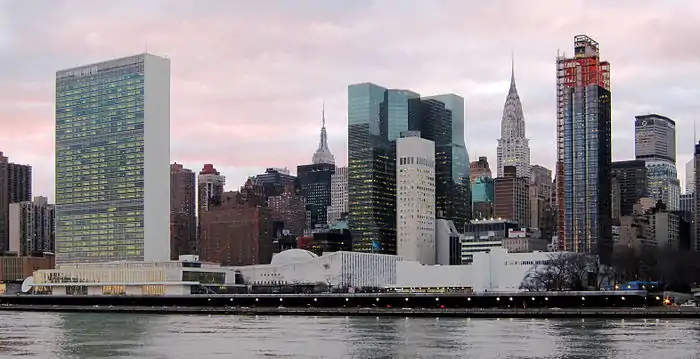Shahrbanou Tadjbakhsh
Shahrbanou Tadjbakhsh (Persian شهربانو تاجبخش) (born 1965) is an Iranian-American researcher, university lecturer, and United Nations consultant in peacebuilding, conflict resolution, counter-terrorism, and radicalization, best known for her work in "Human Security" and for contributions in the republics of Central Asia and Afghanistan. Currently, she is a lecturer at Sciences Po, researcher, and consultant to the United Nations.[1][2][3][4][5][6][7]
Shahrbanou Tadjbakhsh PhD | |
|---|---|
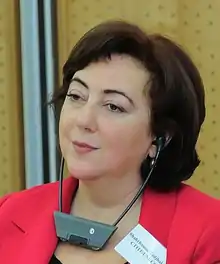 Shahrbanou Tadjbakhsh (circa 2012) | |
| Born | December 5, 1965 |
| Occupation | Researcher, lecturer, consultant |
| Years active | 1995–Present |
| Known for | Human security, Peacebuilding in Central Asia and Afghanistan |
| Academic background | |
| Education | Georgetown University |
| Alma mater | Columbia University |
| Thesis | The A-Soviet Woman of the Muslim East and Nativization in Tajikistan (1994) |
| Doctoral advisor | Edward A. Allworth |
| Academic work | |
| Discipline | History, Sociology, Anthropology, Political Science, Cultural Studies |
| Notable works | Human Security: Concepts and Implications (2007) |
| Notable ideas | "Human Security" |
| Website | https://sciences-po.academia.edu/shahrbanoutadjbakhsh |
Background
Shahrbanou Tadjbakhsh was born on December 5, 1965, in Iran.[1][2][3]
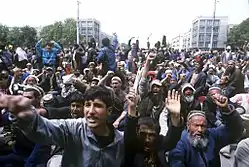
In 1987, she received a BA from Georgetown University; in 1991 she earned an MA and in 1994 a doctorate from Columbia University plus certificate from Columbia's Harriman Institute. Her doctoral thesis was "The A-Soviet Woman of the Muslim East and Nativization in Tajikistan" (1994), supervised by Edward A. Allworth.[1][2][3][8][9][10][11]
Career
Academia
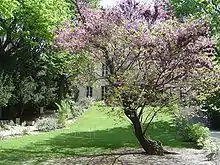
Since 2003, Tadjbakhsh has been an lecturer at Sciences Po. She teaches courses on Human Security at the Paris School of International Studies (PSIA) and at the Summer School within the Institute of Political Studies (Sciences Po), Paris as well as a course on Understanding and Responding to Violent Extremism at the Master's of International Security at Sciences Po.[1][3][5]
In 2015, she gave a series of lectures to four universities in Tehran, Iran. In May 2013, Tadjbakhsh delivered a Kapuscinski Lecture sponsored by UNDP and the European Commission on the theme of Human Security, delivered at the University of Riga and the Stockholm School of Economics in Riga, Latvia.[1]
In addition, in 2002, Tadjbakhsh served as Adjunct Lecturer at Columbia University's School of International and Public Affairs and a Visiting Scholar at the Harriman Institute for post-Soviet Studies through 2004. In 2008, she has been a visiting professor at the Jamia Islamiya University (Jamia-tul-Madina) in India. She has been a visiting professor also at the: Academy of Sciences in Tajikistan (1992), Russian Centre for Strategic Research and International Studies in Russia (1994), Jawaharlal Nehru University in India (Summer 2005), and University of Pretoria in South Africa (February 2009).[3]
Research
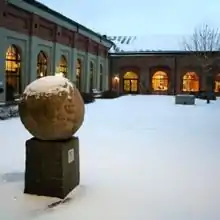
Since 2014, she has been academic advisor to the Afghan Institute of Strategic Studies (AISS) and has provided guidance for the research and publication of a series of papers on radicalization in Afghanistan (in universities, in madrassas, in social media and in the police force).[1][2][12][13]
From 2009 to 2016, Tadjbakhsh was an associate researcher in the CMI–PRIO Afghanistan Initiative "Afghanistan in a Neighborhood Perspective" at PRIO.[1][2][3][14]
From 2007 to 2010, Tadjbakhsh took part in the Peace Research Institute Oslo (PRIO) research project "Liberal Peace and the Ethics of Peacebuilding."[3][15]
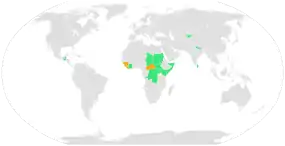
Between 2007–2008, she and ran a one-year joint research project between the Institute of Political Studies (Sciences Po) and Kabul University researching on differences in perceptions on peacebuilding based on liberal values in Afghanistan and its alternatives.
In 2004, Tadjbakhsh founded Journal of Human Security / la revue de Sécurité Humaine at Sciences Po, which ran through 2008.[1][2][3]
United Nations
Tadjbakhsh served on the staff of the United Nations Department of Political Affairs (UNDP) from 1997 to 2003 and since then has worked with various United Nations (UN) organizations and at the Organization for Security and Co-operation in Europe (OSCE).[1][2][4]
Since 2010, Tadjbakhsh has been a consultant for the United Nations Regional Center for Preventive Diplomacy in Central Asia (UNRCCA) and the UN Counter-Terrorism Implementation Task Force (CTITF), for whom she has engaged in preparing and implementing the Action Plan for Implementation of the UN Global Counter-Terrorism Strategy (UNGCTS) in Central Asia.[1][2][18][19]
In collaboration with the UN's Human Security Unit (New York), she prepared a training manual for operationalizing the human security as a concept. She also contributed to the reports of the UN Secretary General on Human Security which led to a General Assembly Resolution in 2012. She trained UN staff on Human Security in various regions. She has helped prepare the Reports on the Millennium Development Goals (MDGs) for Azerbaijan (2013), Uzbekistan (2014) and Tajikistan (2014).
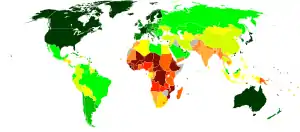
In 2003, Tadjbakhsh left the UN but has continued to contribute to UN Human Development Reports. She led team in preparing Human Development Reports on South Eastern Europe, Afghanistan, Pakistan, Iraq, Iran, Nepal. She also worked with teams in preparing Human Development Reports for Bosnia and Herzegovina, Djibouti, and Mongolia among others.[1][2][4]
In 2000, while also working at the Human Development Report Office at UNDP headquarters (New York City), Tadjbakhsh set up the National Human Development Report (NHDR) Unit in 2000 and ran a Community of Practice Network on Human Development.[1][2][4]
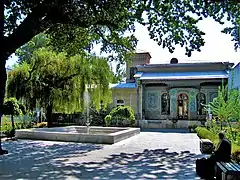
From 1995 and through 2003, Tadjbakhsh worked at the United Nations Development Program (UNDP) at the Regional Bureau for Europe and the Commonwealth of Independent States (CIS), based in Tashkent (Uzbekistan) and in Bratislava (Slovakia), covering 27 countries of the region. She worked in peacebuilding, conflict resolution, counter-terrorism, and radicalization. She collaborated with UN agencies including the Political Affairs, United Nations Office for the Coordination of Humanitarian Affairs (UNOCHA), United Nations Economic and Social Commission for Asia and the Pacific (UNESCAP) as well as the Organization for Security and Co-operation in Europe (OSCE).[1][2]
Current
Tadjbakhsh continues as an lecturer at Sciences Po. Currently she is teaching a course on Human Security and a course on Understanding and Responding to Violent Extremism, both at the Master's of International Security at Sciences Po. She also runs a summer course on Human Security at Sciences Po.[1][7] [20][21]
Tadjbakhsh continues as a researcher and UN consultant. In January 2018, she worked with the Permanent Mission of Kazakhstan to the United Nations on their Presidency of the United Nations Security Council to help with resolutions and statements on counter-terrorism and on Afghanistan.[22]
Human Security
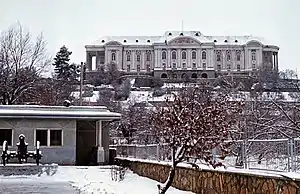
As a leader of the Human Security Specialization at the Institute of Sciences Po, Tadjbakhsh advocates for broad definition of "Human Security" to encompass not only freedom from fear but also freedom from want and indignity.
In May 2013, she delivered a Kapuscinski Lecture sponsored by UNDP and the European Commission on the theme of Human Security, delivered at the University of Riga and the Stockholm School of Economics in Riga, Latvia.[23]
Personal life
Tadjbakhsh has served on the Board of Governors of Jacobs University/International University of Bremen Germany between (2008–2010). She has also served on advisory boards of the: Cahiers de L’Orient (2007–2008), Central Asian Monitor (1993-2000), and the Afghanistan Institute for Strategic Studies.[24]
Works
Tadjbakhsh's work appears in detail on WorldCat.[25] They include:
Books:
- A Rock Between Hard Places: Afghanistan in its Regional Security Complexes with Kristian P. Harpviken (2016)[6][26][27][28]
- Rethinking the Liberal Peace: External Models and Local Alternatives, edited by Shahrbanou Tadjbakhsh, (New York: Routledge, 2011)[4][5][29][30][31]
- Human Security: Concepts and Implications with Anuradha M. Chenoy (New York: Routledge, 2007)[4][5][32][33]
Chapters, articles, other:
- "Iran and its Relationship with Afghanistan After the Nuclear Deal" with Mohammed Fazeli (2016)[34]
- "Regional Responses to Radicalization in Afghanistan: Obstacles, Opportunities and an Agenda for Action" (2016)[35]
- "Strangers Across the Amu River: Community Perceptions Along the Tajik–Afghan Borders" with Kosimsho Iskandarov and Abdul Ahad Mohammadi (Stockholm: SIPRI/OSF, 2015)[36]
- "Human Security Twenty Years On" in Norwegian Peace Building Resource Center Paper (2014)[37]
- "In Defense of the Broad Approach of Human Security" in Handbook on Human Security (2013)[38]
- "The Persian Gulf and Afghanistan: Iran and Saudi Arabia's Rivalry Projected" (2013)[39]
- "Turf on the Roof of the World" (2012)[40]
- "Central Asia and Afghanistan: Insulation on the Silk Road, Between Eurasia and the Heart of Asia" (2012)[41]
- "After 9/11: A Wasteland of Buried Reason" (2011)[42]
- "Post-War on Terror? Implications from a Regional Perspective" (2011)[43]
- "South Asia and Afghanistan: The Robust India-Pakistan Rivalry" (2011)[44]
- "Towards a Human Security Approach to Peacebuilding" with Edward Newman and Madoka Futamura (2010)[45]
- "International Relations Theory and the Islamic World View" (2010)[46]
- "Human Security and the Legitimization of Peacebuilding" (2009)[47]
- "Liberal Peace is Dead? Not So Fast" (2009)[48]
- "Peacemaking in Tajikistan and Afghanistan: Lessons Learned and Unlearned" (2008)[49]
- "Playing with Fire? The International Community's Democratization Experiment in Afghanistan" with Michael Schoistwohl (2008)[50]
- "Normative and Ethical Frameworks for Human Security in Eastern and Central Europe: A Status Report" with Odette Tomasco-Hatto (2007)[51]
- "Human Security: Concept, Implications and Application for Post-Intervention Afghanistan" (2005)[52]
- "Between Socialism and Islam: Women in Tajikistan" (1996)[53]
- "National Reconciliation in Tajikistan: the Imperfect Whim" (1995)[54]
- "Tajikistan: A Forgotten Civil War" with Nassim Jawad (1995)[55]
- "The Bloody Path of Change: The Case of Post-Soviet Tajikistan" (1993)[56]
- "Tajikistan: From Freedom to War" (1994)[57]
- "The Tajik Spring of 1992: A Comparison of Tajik Political Parties" (1993)[58]
- "Causes and Consequences of the Civil War" (1993)[59]
See also
References
- "Shahrbanou Tadjbakhsh". Sciences Po. 2016-10-18. Retrieved 26 November 2017.
- "Shahrbanou Tadjbakhsh". Academia.edu. Retrieved 26 November 2017.
- "Shahrbanou Tadjbakhsh". Peace Research Institute Oslo (PRIO). 2016. Retrieved 26 November 2017.
- "Shahrbanou Tadjbakhsh". Norwegian Centre for Conflict Resolution. 2016. Retrieved 26 November 2017.
- "Shahrbanou Tadjbakhsh". Open Democracy. Retrieved 29 January 2018.
- "Book Launch with Author Shahrbanou Tadjbakhsh" (PDF). George Washington University. 1 September 2016. Retrieved 29 January 2018.
- "Summer School: Human Security". Sciences Po. 2018-01-23. Retrieved 5 February 2018.
- Cummings, Sally N. (11 September 2012). Sovereignty After Empire. Edinburgh University Press. p. 386. ISBN 9780748675395. Retrieved 29 January 2018.
- Allworth, Edward A., ed. (1994). Central Asia, 130 Years of Russian Dominance: A Historical Overview. Duke University Press. p. 617. ISBN 978-0822315216. Retrieved 29 January 2018.
- John Heathershaw; Edmund Herzig, eds. (13 September 2013). The Transformation of Tajikistan: The Sources of Statehood. Routledge. p. 16. ISBN 9781135697600. Retrieved 29 January 2018.
- Tadjbakhsh, Shahrbanou (27 October 2016). "Remembering Edward Allworth". Eurasianet. p. 16. Retrieved 29 January 2018.
- "Liberal Peace and the Ethics of Peacebuilding". Afghan Institute for Strategic Studies. 26 January 2015. Retrieved 28 January 2018.
- "Board Of Advisors". Afghan Institute for Strategic Studies. Retrieved 28 January 2018.
- "Afghanistan in a Neighborhood Perspective". PRIO. Retrieved 28 January 2018.
- "Liberal Peace and the Ethics of Peacebuilding". PRIO. Retrieved 28 January 2018.
- "United Nations Peacebuilding Commission". United Nations. Retrieved 10 April 2012.
- "Where we fund-United Nations Peacebuilding Fund". United Nations. Retrieved 10 April 2012.
- "Towards the Implementation of the Joint Plan of Action for the United Nations Global Counter-Terrorism Strategy in Central Asia Effectively Countering the Financing of Terrorism" (PDF). UNRCCA. December 2016. Retrieved 5 February 2018.
- "Turkmenistan and NATO hold forum on regional peace and stability". NATA. 6 March 2015. Retrieved 5 February 2018.
- "Summer School: Professors". Sciences Po. 2014-06-23. Retrieved 5 February 2018.
- "Summer School: Social Sciences". Sciences Po. 2014-06-23. Retrieved 5 February 2018.
- "Nazarbayev's visit shows best features of Kazakhstan's diplomacy - UN consultant". KazInform International News Agency. 18 January 2018. Retrieved 5 February 2018.
- "Human Security in Developing World". Kapuscinski Development Lectures. Retrieved 4 February 2018.
- "Professor Shahrbanou Tadjbakhsh". Afghanistan Institute for Strategic Studies. Retrieved 26 November 2017.
- "Tadjbakhsh, Shahrbanou". worldcat.org. Retrieved August 27, 2016.
-
Tadjbakhsh, Shahrbanou; Harpviken, Kristian P. (2016). "A Rock Between Hard Places: Afghanistan in its Regional Security Complexes". Oxford University Press/Hurst Publishers. doi:10.1093/acprof:oso/9780190627232.001.0001. ISBN 9780190663018. Cite journal requires
|journal=(help) - Bammi, Y.M. (4 November 2017). "A Rock Between Hard Places: Afghanistan in its Regional Security Complexes" (PDF). Journal of Defence Studies. Retrieved 29 January 2018.
- Harpviken, Kristian Berg (30 January 2018). "Nytt kapittel i det store spillet om Afghanistan (New chapter in the big game about Afghanistan)". ABC Nyheter (ABC News). ABC Startsiden AS. Retrieved 29 January 2018.
- Tadjbakhsh, Shahrbanou, ed. (2011). Rethinking the Liberal Peace: External Models and Local Alternatives. Routledge. LCCN 2010042134.
- Tadjbakhsh, Shahrbanou, ed. (2011). Rethinking the Liberal Peace: External Models and Local Alternatives. Routledge. Retrieved 26 November 2017.
- Tadjbakhsh, Shahrbanou, ed. (2011). Rethinking the Liberal Peace: External Models and Local Alternatives. Routledge. Retrieved 28 January 2018.
- Tadjbakhsh, Shahrbanou; Chenoy, Anuradha M. (2008). Human Security: Concepts and Implications. Routledge. ISBN 9780415473385. LCCN 2006022001.
- Tadjbakhsh, Shahrbanou; Chenoy, Anuradha M. (2007). Human Security: Concepts and Implications (PDF). Routledge. ISBN 9780415473385. Retrieved 28 January 2018.
- Tadjbakhsh, Shahrbanou; Fazeli, Mohammed (July 2016). "Iran and its Relationship with Afghanistan After the Nuclear Deal" (PDF). PRIO. Retrieved 28 January 2018.
- Tadjbakhsh, Shahrbanou (March 2016). "Regional Responses to Radicalization in Afghanistan: Obstacles, Opportunities and an Agenda for Action". PRIO. Retrieved 28 January 2018.
- Tadjbakhsh, Shahrbanou; Iskandarov, Kosimsho; Mohammadi, Abdul Ahad (October 2015). "Strangers Across the Amu River: Community Perceptions Along the Tajik–Afghan Borders". SIPRI/OSF. Retrieved 28 January 2018.
- Tadjbakhsh, Shahrbanou (26 June 2014). "Human Security Twenty Years On" (PDF). NOREF. Retrieved 28 January 2018.
- Tadjbakhsh, Shahrbanou (2013). "In Defense of the Broad Approach of Human Security" (PDF). Routledge. Retrieved 28 January 2018.
- Tadjbakhsh, Shahrbanou (2013). "The Persian Gulf and Afghanistan: Iran and Saudi Arabia's Rivalry Projected" (PDF). PRIO. Retrieved 28 January 2018.
- Tadjbakhsh, Shahrbanou (October 2012). "Turf on the Roof of the World" (PDF). NOREF. Retrieved 28 January 2018.
- Tadjbakhsh, Shahrbanou (2012). "Central Asia and Afghanistan: Insulation on the Silk Road, Between Eurasia and the Heart of Asia" (PDF). PRIO. Retrieved 28 January 2018.
- Tadjbakhsh, Shahrbanou (10 September 2011). "After 9/11: A Wasteland of Buried Reason". Open Democracy. Retrieved 28 January 2018.
- Tadjbakhsh, Shahrbanou (August 2011). "Post-War on Terror? Implications from a Regional Perspective" (PDF). NOREF. Retrieved 28 January 2018.
- Tadjbakhsh, Shahrbanou (2012). "South Asia and Afghanistan: The Robust India-Pakistan Rivalry" (PDF). PRIO. Retrieved 28 January 2018.
- Tadjbakhsh, Shahrbanou; Newman, Edward; Futamura, Madoka (2010). Towards a Human Security Approach to Peacebuilding. United Nations. ISBN 9789280835175. Retrieved 28 January 2018.
- Tadjbakhsh, Shahrbanou (2010). "Non-Western International Relations Theory: Perspectives on and Beyond Asia". Routledge. Retrieved 28 January 2018.
- Tadjbakhsh, Shahrbanou (2009). Advances in Peacebuilding. Routledge. Retrieved 28 January 2018.
- Tadjbakhsh, Shahrbanou (27 November 2009). "Liberal Peace is Dead? Not So Fast". Open Democracy. Retrieved 28 January 2018.
- Tadjbakhsh, Shahrbanou (2008). "Peacemaking in Tajikistan and Afghanistan: Lessons Learned and Unlearned". SciencesPo/CERI. Retrieved 28 January 2018.
- Tadjbakhsh, Shahrbanou; Schoistwohlh, Michael (2008). "Peacemaking in Tajikistan and Afghanistan: Lessons Learned and Unlearned". Journal of International Peacekeeping. 15 (2): 252–267. doi:10.1080/13533310802041535. S2CID 153926270.
- Tadjbakhsh, Shahrbanou; Tomasco-Hatto, Odette, eds. (2007). Normative and Ethical Frameworks for Human Security in Eastern and Central Europe: A Status Report (PDF). UNESCO. Retrieved 28 January 2018.
- Tadjbakhsh, Shahrbanou (September 2005). "Human Security: Concept, Implications and Application for Post-Intervention Afghanistan" (PDF). Études du CERI. Retrieved 28 January 2018.
- Tadjbakhsh, Shahrbanou (1996). Women in the Wider Muslim World. Lynne Rienner. ISBN 9781555875787. Retrieved 28 January 2018.
- Tadjbakhsh, Shahrbanou; Motyl, Alexander (1995). "Human Security: Concept, Implications and Application for Post-Intervention Afghanistan" (PDF). Central Asian Survey. Retrieved 28 January 2018.
- Tadjbakhsh, Shahrbanou; Jawad, Nassim (1995). Tajikistan: A Forgotten Civil War. The Minority Rights Group. ISBN 9781897693803. Retrieved 28 January 2018.
- Tadjbakhsh, Shahrbanou (1993). The Bloody Path of Change: The Case of Post-Soviet Tajikistan. Harriman forum, 6,1993:11. Columbia University Harriman Institute Forum. Retrieved 28 January 2018.
- Tadjbakhsh, Shahrbanou (1994). "Tajikistan: From Freedom to War". Central Asia. Retrieved 29 January 2018.
-
Tadjbakhsh, Shahrbanou (April 1993). "The Tajik Spring of 1992: A Comparison of Tajik Political Parties". Central Asian Monitor. Missing or empty
|url=(help) -
Tadjbakhsh, Shahrbanou (February 1993). "The Tajik Spring of 1992: A Comparison of Tajik Political Parties". Central Asian Monitor. Missing or empty
|url=(help)
External sources
- "Shahrbanou Tadjbakhsh". Sciences Po. 2016-10-18. Retrieved 26 November 2017.
- "Shahrbanou Tadjbakhsh". Academia.edu. Retrieved 26 November 2017.
- "Shahrbanou Tadjbakhsh". Peace Research Institute Oslo (PRIO). 2016. Retrieved 26 November 2017.
- "Shahrbanou Tadjbakhsh". Norwegian Centre for Conflict Resolution. 2016. Retrieved 26 November 2017.
- Personal website
- Stockholm International Peace Research Institute (SIPRI)
- Harriman Institute
- C-SPAN
